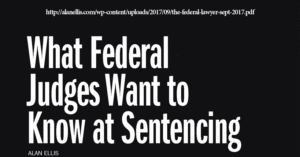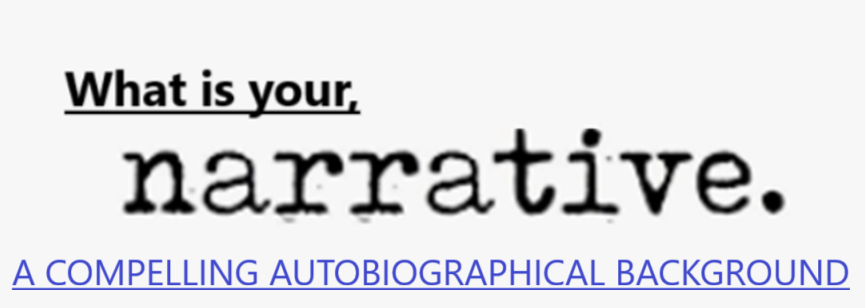FEDERAL JUDGES – YOUR PERSONAL STORY, AND WHY IT MATTERS.
A Compelling Autobiographical Narrative. It helps your Legal Defense Team and Sentence.
*
“Don’t wait to think about sentencing advocacy,” since 99 percent of federal criminal clients will be facing sentencing, start preparing the case for sentencing early on.
–Federal Judge Robert N. Scola
*
“It’s surprising how many otherwise competent attorneys punt at the sentencing hearing.”
–Federal Judge Patrick J. Schiltz
*
“…the importance of writing your personal narrative and including it in your pre-sentence report.”
*
*
Exploring the Intersection of Law and Individual Experiences
The field of law is guided by universal principles, statutes, and precedents. Lawyers, as advocates for justice, are skilled in the law and case strategies. However, a person’s unique background often remains unexamined in a traditional legal defense, as they often do not have the time to understand who ‘you’ indeed are, delve into your background, or explore the experiences from your past that may have influenced your choices that led to your current situation. This deeper connection is crucial, as it can shape a more complete defense under 18 U.S. Code § 3553 – The Imposition of a Sentence.
*
Understanding Personal Background in Legal Contexts
Understanding a person’s background is crucial in appreciating their unique journey through life. Elements such as cultural heritage, socioeconomic history, psychological experiences, family dynamics, and deeply held values shape who we are. These aspects not only enrich our understanding of individuals but also highlight the complexities that can inform defense strategies and character assessments.
*
In the courtroom, personal backgrounds play a crucial role alongside evidence and legal arguments. They can reveal significant motivations and mitigating circumstances not typically included in a standard defense. Psychological trauma and cultural differences, for instance, can greatly affect behavior, emphasizing that everyone has a unique story deserving of understanding.
- To ensure your history is recognized, provide your legal team with a clear story or narrative of your past, including both positive and negative aspects. Take responsibility for your actions, express genuine remorse for the harm caused, and avoid making excuses. This method can assist your defense team in uncovering insights that bolster your case during a trial or in preparation for your presentence interview, if necessary.
*
Enhancing Legal Defense Through Personal Nuances
Incorporating personal backgrounds into legal defense is not about making excuses, but rather about contextualizing actions within the framework of lived experiences. This approach can foster more compassionate and insightful evaluations from judges and juries. For instance:
- Mitigation: Certain circumstances, such as economic hardship or mental health challenges, may mitigate the severity of actions in the eyes of the law, influencing sentencing outcomes.
- Letters Attesting to Character and Witnesses Testimonials from community members who understand the defendant’s background can provide a holistic perspective on their character and rehabilitation potential.
- Cultural Considerations: Cultural norms and values may explain behaviors that seem incongruent with mainstream expectations, fostering understanding and reducing bias.
*
Reflection and Growth Beyond the Plea or Trial – The Narrative
Delving into a person’s background. The defense process can trigger profound self-reflection prior to a trial. Often, trials present scenarios where accepting a plea deal emerges as the most favorable option, serving as a pivotal moment of reckoning. By comprehensively understanding the factors that have shaped their lives, individuals can pinpoint the obstacles that hinder their progress and the strengths that can propel their transformation. This critical introspection empowers individuals to:
- Identify that one ‘Nugget’ of personal information could be all that defense counsel may need to provide the needed defense.
- Recognize Patterns: Identifying recurring themes in one’s background can help make sense of past choices and avoid similar pitfalls in the future.
- Foster Healing: Acknowledging and addressing long-standing issues, such as trauma or strained relationships, can pave the way for emotional and psychological healing.
- Help Chart a Path Forward: Understanding one’s history empowers individuals to take control of their narrative and build a future aligned with their values and aspirations.
*
Bridging the Gap Between Law and Humanity
Integrating diverse backgrounds into legal defense enhances the law’s integrity rather than undermining it. This approach transforms justice from a mere application of rules into a compassionate understanding of humanity. Both lawyers and defendants benefit from acknowledging that the law is intertwined with the complexities of their lives.
*
Conclusion
While lawyers are skilled in the letter of the law, the spirit of justice demands consideration of the human stories behind legal cases. Incorporating the nuances of personal background into legal defenses is not about undermining legal standards but about enriching the pursuit of fairness. By acknowledging the complexities of human behavior and context, the legal system can evolve to reflect the diversity and depth of the society it serves.
a
It hinges on the participation and desire of the defendant to be introspective, and look for the reason that brought his to this moment facing the judge today. Why? Because judges ultimately know that crimes do not happen in a vacuum and they want to understand, from you, what happened in your life that brought you here today.

*
What Happens Next?
Have Your Questions Regarding the Dos and Don’ts of Prison Life Been Answered?
*
What To Expect Has Been Determined By Your Narrative, Allocution, and PSR
Appeals, sometimes, are successful.
*



